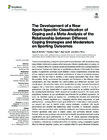The development of a new sport-specific classification of coping and a meta-analysis of the relationship between different coping strategies and moderators on sporting outcomes
Citation
Nicholls AR,Taylor NJ,Carroll S and Perry JL (2016) The Development o fa New Sport-Specific Classification of Coping and a Meta-Analysis of the Relationship between Different Coping Strategies and Moderators on Sporting Outcomes. Front. Psychol. 7:1674. doi: 10.3389/fpsyg.2016.01674

View/
Date
2016Author
Perry, John
Nicholls, Adam R.
Carroll, Sean
Taylor, Natalie J.
Peer Reviewed
YesMetadata
Show full item record
Nicholls AR,Taylor NJ,Carroll S and Perry JL (2016) The Development o fa New Sport-Specific Classification of Coping and a Meta-Analysis of the Relationship between Different Coping Strategies and Moderators on Sporting Outcomes. Front. Psychol. 7:1674. doi: 10.3389/fpsyg.2016.01674
Abstract
There is an ever growing coping and sports performance literature, with researchers using many different methods to assess performance and different classifications of coping. As such, it makes it difficult to compare studies and therefore identify how coping is related to performance. Furthermore, there are no quantitative syntheses of the results from these studies. A quantitative synthesis would facilitate a more comprehensive understanding of how coping is associated with athletic performance. In order to accurately compare studies, our first aim was to develop a new coping classification that would make this possible. Firstly,we reviewed the strengths and limitations of the different coping classifications and then identified the commonalities and differences between such classifications. We opted for a three-factor classification of coping, because the evidence suggests that a three-factor classification provides a superior model fit to two- factor approaches. Our new classification of coping was based on an existing model from the developmental literature, which received an excellent model fit. We made some adaptations, however, as our classification was intended for an athletic population. As such, we classified coping as mastery (i.e., controlling the situation and eliminating the stress or),internal regulation (i.e.,managing internal stress responses),or goal withdrawal (i.e.,ceasing efforts toward goal attainment).Undertaking a meta-analysis, our second aim was to identify which coping strategies correlated with sports performance and whether this relationship varied according to moderator variables. Articles were sourced from online electronic databases and manual journal searches. PRISMA guidelines were used to search, select, and synthesize relevant studies. Random effects meta-analyses were performed to identify associations between coping classification and sport performance. Q, I2, and R2 values assessed heterogeneity. Eighteen published investigations, including 3900 participants and incorporating fifty-nine correlations, indicated an overall positive effect for mastery coping, an eligible negative effect for internal regulation coping, and a negative effect for goal withdrawal strategies. The findings of this meta-analysis could be used by sports practitioners to help them deliver effective coping interventions. In order to maximize performance, practitioners could encourage the use of mastery coping, but advise their athletes not to use goal withdrawal strategies.
Keywords
AgeGender
Goal attainment
Objective performance
Subjective performance

